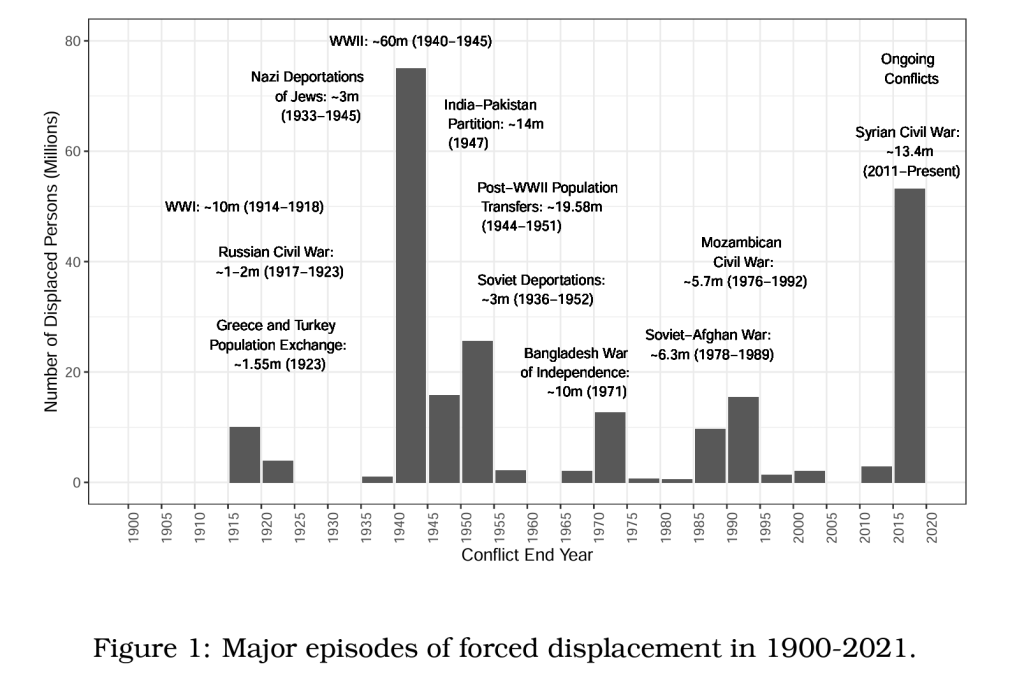timespace coordinates: the long 20th century
To say that this epochal documentary with all its flaws, its non-sequiturs, and under-theorizing has marked our generation is an understatement. Some things are left unsaid in retrospect (it is almost 10 years or more since I have watched this series), particularly one should situate this in the context of modernity and the transfer of peoples of ideas that went on between Europe and the US, none of which went one way only. Again this is a very Eurocentric history (for a different perspective on techno-modernity check here), so it has definite and clear limits as it is mostly about the Euroatlantic world and Central Europe. The Century of the Self is also the triumph over the European Old World bourgeois civilization of the US consumer culture zeitgeist aptly described by Victoria de Grazia in her magisterial study Irresistible Empire.

Source: Charnysh 2022 quoted by Adam Tooze (not Curtis!)
But then, on the other hand, you have had the immense impact of these foreigners with bad Middle European or Eastern European accents forced to flee, outernational émigrés escaping anti semitism arriving in troves from the continent. Besides the German Frankfurter Schule critical theory – you also had another cultivated emigree diaspora from the former Habsburg Empire that brought to the East Coast with them the vivaciousness and sophistication of Viennese 1900 cultural life and went on to define advertising, marketing, and even how Western liberalism identity started defining itself during the Cold War against the Communist bloc. Another history that barely gets mentioned is how the Western democracies have been using for example – “rational choice theory” (and here the names of William Riker, Kenneth Arrow, and James Buchanan stand out) – to try and immunize the ‘Free World’ and its values by constructing a ‘scientific’ approach to social science research against the Marxist critics of Western democracies. Some ideas found a better reception across the ocean,
Psychoanalysis is just one such example to follow in the wake of the fall of the Habsburg Empire. One could pinpoint others, starting with the Genevese school of neoliberal economics. Another one, followed in detail by Adam Curtis is the trajectory of Freud and his nephew Edward Bernays (developer and early pioneer of PR) and Anna Freud in the United States. We should be wary of a pharmakon way of explaining everything or giving too much attention to ‘interiority’ and inner mental states, but since Foucault, detailing such genealogies and discoursive fields helps us understand how we came to be where we are. This documentary is also influenced by The Century of the Self is still a very compelling history of how the SELF became so central not only to advertising but also to identity politics and individual freedom of liberal capitalism also to the anthropotechnics – ways in which Western counterculture has tried to free the human subject or a hidden identity through mindfulness, techniques of meditation, human potential, yoga retreats, actualization what is known as New Age – especially as developed by the Esalen Institute since the 1960s California. It is also the perfect documentary about control after “decentralization”, or what follows in the wake of the uneven transition from the disciplinary society to what Deleuze has termed the society of control in his seminal essay from 1990 (some even say that this was his most important testament). The century of the self has become even more evident in the 21st century – the time when protocols or algorithmic capitalism is really ruling the day and when AI-driven scams, influencers, and deep fakes abound. The century of the self should be also put into dialectical relation with its inverse – the “personality cults” and authoritarian styles of the former East it was meant to overcome, and such a retreat into interiority and VR, when faced with the horrors of Vietnam War, and the government of the US supporting dictators abroad or signaling a failure of nation-building abroad or a certain developmental model. Silicon Valley is itself a piece in this puzzle, an innovation hub based on a startup model supported by Venture Capital funding to ensure US technological hegemony by sponsoring former dropouts of the counter-cultural revolutions of 1968, raised on psychotropics and weaned on petro-dollars.










